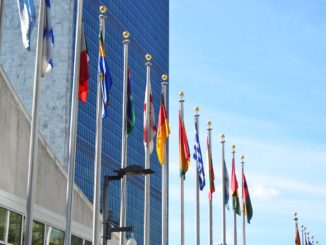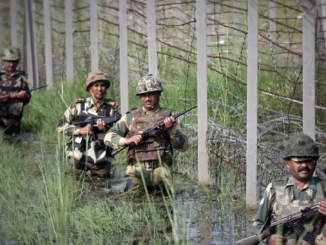
A recent story by a little known entity has alleged that Pakistan is working with China to produce the COVID-19 vaccine and undertake activities such as working on the anthrax-like pathogens while citing unknown source – is false and misleading. Pakistan’s Ministry of Foreign Affairs spokesman has already refuted these charges by stating:
It is a politically motivated and fake story, composed of distortion of facts and fabrications that quote anonymous sources. There is nothing secret about the Bio-Safety Level-3 (BSL-3) Laboratory of Pakistan referred to in the report. Pakistan has been sharing information about the facility with the State Parties to the BTWC in its submission of Confidence Building Measures. The facility is meant for diagnostic and protective system improvement by R&D on emerging health threats surveillance and disease outbreak investigation.
Pakistan strictly abides by its BTWC obligations and has been one of the most vocal supporters for a strong verification mechanism to ensure full compliance by the State Parties to the Convention. The attempt to cast aspersions about the facility is particularly absurd against the backdrop of the COVID-19 pandemic, which has highlighted the need for better preparedness in the areas of disease surveillance and control and international collaboration in that regard consistent with Article X of BTWC”.
The fake and politically motivated report by Australian journalist Anthony Klan seems to create hindrance in the pioneering research work Pakistan wants to take over for the production of the COVID-19 vaccine and diagnosis and control of other Emerging Infectious Diseases outbreak in the future.
Pakistan has a principled position regarding biological weapons and is fully committed to the objectives of the BWC, which is an important disarmament treaty that bans WMDs and recognizes equal and undiminished security for all member states. Pakistan signed BWC in 1972 and ratified it in 1974 as one of 22 initial member states whose ratification was necessary for the entry into force of the convention. Since 1974, Pakistan has maintained a positive and constructive approach towards the BWC.
Since 1972, Pakistan has complied with all the obligations of the BWC. At the International level, Article IV of BWC requires each state party to take necessary measures to prohibit and prevent the development, production, stockpiling acquisition or retention of agents, toxins, weapons, equipment, and means of delivery. Over the years, numerous legislative, regulatory, and administrative measures have been taken to comply with the Convention including criminalizing and penalizing violations through various legislative acts, ordinances, the introduction of biosafety, and biosecurity measures, and strengthening of export controls. Pakistan’s Ministry of Foreign Affairs has been designated as the national focal point in the notification of biosafety rules 2005. Pakistan is also part of the Global Health Security Agenda and is participating actively in all its programs.
On the legislative side, Pakistan Penal Code penalizes those who are involved in acts of spreading dangerous diseases under section 270 of the code. The Drug Act 1976 prohibits and penalizes export, import, manufacture, or sale of any spurious material. The Plant Quarantine Act of 1976 provides a mechanism to control materials that can be used in biological weapons. Animal quarantine Act 1979, regulates the import, export, and quarantine of animals and products to prevent the introduction or spread of disease. The Anti-Terrorist Act of 1979, penalizes any production and development of biological weapons and their use. Environmental Protection, Act 1997, prohibits the generation, collection, consignment, transport, treatment, disposal of storing, handling, and importing hazardous substances. The Export Control Act 2004, helps us to abide by non-proliferation obligations of the Convention, then the Biosafety and Security Rules 2005; a guide on how to ensure the peaceful uses, safe and secure use of living and modified organisms and to prevent diversion to their misuse.
These rules also stipulate the monitoring of all development activities of life sciences. The Ministry of Foreign Affairs, export licensing, and enforcement rules were notified in 2009, which provide a set of detailed procedures on licensing sensitive dual-use goods listed in the control Lists. National Guidelines for the Code of Conduct for Life Scientists 2010 and Policy guidelines on Strategic Export Controls were notified in 2016 as the principal guideline for the licensing division. In 2017, the National Laboratory Policy was introduced. The important point is that all such viruses, bacteria and fungi are subject to licensing that is mentioned in the control list and it is primarily to ensure transfer for peaceful purposes only.
Pakistan gives biotechnology a high priority as a key to S&T development. In 2001, the National Commission of Biotechnology (NCB) was formed to pursue biotechnological research in Pakistan. It funded conferences, workshops for the popularization of Biotechnology, and established Pakistan Biotech Information Centre (PABIC). NCB also established about 16 biotechnology centres at different universities and invested about US$ 17 million in about 70 R&D projects to popularize biotechnology in Pakistan. Although Pakistan has a well-developed biotechnology research and development infrastructure, there is no evidence of any Pakistani program to develop, produce, or stockpile biological weapons or agents. In 2015, the US State Department confirmed that there was no indication that Pakistan was out of compliance with its BTWC commitments.
Pakistan scrupulously shares all the information required in this regard as a responsible state. The BTWC was informed about the Biosafety level-3 facilities in Confidence Building Measures declaration made by Pakistan to BTWC state parties. During COVID-19 the Biosafety Level 3 facilities developed earlier at the National Institute of Health (NIH) are being used to handle the high-risk microorganisms. The Institute is actively involved in the laboratory and field investigation of infectious diseases with an emphasis on human resource development and capacity building. Disease Surveillance, Response Units (DSRU’s) are working very actively with provincial, and district health authorities on event-based disease surveillance and outbreak and also conducting courses in the Field Epidemiology & Laboratory Training Program (FELTP) which is the joint initiative of the NIH and the Centres for Disease Control and Prevention (CDC) USA, aimed at strengthening the national capacity in disease surveillance and outbreak response. The Objective of FELTP is to strengthen the IHR core capacity of the workforce for real-time surveillance response.
During COVID-19 pandemic a team of Chinese health experts including epidemiologists, ICU specialists, IPC specialists, medical specialists, and outbreak control specialists visited the National Institute of Health (NIH) for sharing their experiences in managing and combating Coronavirus (COVID-19. The Chinese team visited the facilities and mentioned that the NIH facilities need to be upgraded to handle COVID-19 like pandemics and other infectious diseases in the future. Pakistan has agreed to move forward with the development of a new vaccine to combat Coronavirus COVID-19 with the East Gate Biotech company. Recently, a large Chinese pharmaceutical company “China Sinopharm International Corporation” has also invited the National Institute of Health of Pakistan to collaborate in conducting clinical trials in Pakistan of its recently developed vaccine for coronavirus. It will make Pakistan as one of the first few countries for the launch of a COVID-19 vaccine.
On the implementation challenges, rapid scientific and technological developments have created new threats, as well as new opportunities for international cooperation. The first is verification due to the dual-use nature of cutting-edge emerging technologies. There is also need for an organization similar to the National Authority on Chemical Weapons Convention (NACWC) which can coordinate multiple aspects of BWC. During COVID-19 it is felt that more coordination among the government institutions and other stakeholders for bioethics, biosecurity, and biosafety is desirable and there is also a need to increase awareness in the general public, researchers, academia, and industry. There is also a need to increase awareness of researchers on the role of the guidelines provided by the National Biosafety Committee or Institutional Biosafety Committees.
Pakistan has to pay a lot of emphasis on surveillance and Early Detection System at the provincial level as well as federal. Pakistan is also working in line with the WHO Global Action Plan to develop a renowned Disease Surveillance, Response Units System for surveillance. It may also be emphasized that diplomatic efforts, cooperation, collaboration, and global governance at all levels is needed to find out the solutions to the Emerging Infectious Diseases and pandemics like COVD-19. Nations better prepare and equip themselves for any next crisis and rethink to fight it globally together.




However, the attempt to cast aspersions about the facility is particularly absurd against the backdrop of the Covid-19 pandemic, which has highlighted the need for better preparedness in the areas of disease surveillance and control and international collaborations in that regard, consistent with Article X of BTWC.